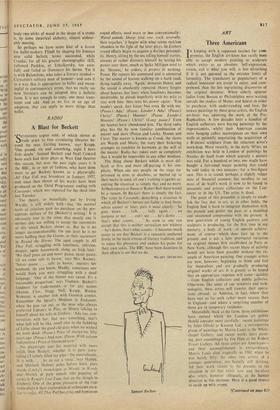RADIO
A Blast for Beckett
`SEVENTEEN copies sold, of which eleven at trade price to free circulating libraries be- yond the seas. Getting known,' says Krapp. 'One pound, six and something, eight I have little doubt.' Samuel Beckett and Noel Coward have each had three plays at West End theatres this season, but over the past eight years it is the BBC, in or out of fashion, who have done most to get Beckett known as a playwright. All That Fall was broadcast in January 1957, and since then eleven of his works have been produced on the Third Programme, ending with Cascando, which was repeated for the third time last Tuesday.
The theory. so beautifully put by Irving Wardle, is still widely held—that 'the normal tools of criticism gain no purchase on the pre- cipitous surface of his [Beckett's] writing.' It is Obviously true in the sense that mostly one is neither able nor willing to accept the enormities of life which Beckett shows us. But he is no longer incomprehensible. On one level he is no more baffling than the Goons, or their successors in Round the Horne. The aged couple in All That Fall, struggling with loneliness, oblivion, despair, totter homewards along an Irish lane: 'We shall press on and never pause, never pause, till we come safe to haven,' says Mrs. Rooney. 'Never .pause . . . safe to haven,' mutters her husband, 'do you know, Maddy, sometimes one would think you were struggling with a dead language.' One of the thieves was saved. It's a reasonable proportion,' says Vladimir. Beckett's fondness for trade-names, or for any names (Hamm, Cloy, Nagg, Nell, Krapp, Bianca, Woburn), is another link with Goonish comics. Remember the Spratt's Medium in Endgame, when the pap ran out, or the man who always preferred Lipton's in Play, or Henry talking to himself about his wife in Embers: 'Ada too, con- versation with her, that was something, that's what hell will be like, small chat to the babbling of Lethe about the good old days when we wished we were dead. (Pause.) Price of margarine fifty years ago. (Pause.) And now. (Pause. With solemn indiontion.) Price of blueband now!' No playwright uses his material with more relish than Beckett, whether it is pure story- telling.('I calmly filled my pipe the meerschaum, lit it with . . . let us say a vesta.' says Hamm, and Sherlock Holmes pales before him), pure words (Lucky's monologue or Words' in Words and Music), or pure sounds (the popping of corks in Krapp's Last Tape, feet on the shingle in Embers). One of the great pleasures of the four radio plays is their exploration of techniques pecu- liar to radio. All That Fall has crisp and humorous sound effects, used more or less conventionally: 'Rural sounds. Sheep. bird, cow. cock, severally, then together,' it begins with what seems reckless abandon in the light of the later plays. In Embers sound effects begin to acquire a distinct personal- ity. Henry, sitting by the sea telling himself stories, amuses or rather distracts himself by testing his power over them, much as Spike Milligan used to do. 'Hooves,' he orders, a propos of nothing. Pause. He repeats his command and is answered by the sound of hooves walking on a hard road, dying rapidly away. 'Again.' demands Henry, and the sound is obediently repeated. Henry forgets about hooves, but later, when loneliness becomes intolerable, he pleads hopelessly with his wife to stay with him, then tests his power again: 'You needn't speak. Just listen.' Not even. Be with me. (Pause.) Ada! (Pause. Louder.) Ada! (Pause.) Christ! (Pause.) Hooves! (Pause. Louder.) Hooves! (Pause.) Christ! (Long pause.)' Even the hooves have abandoned him. The third radio play has the by now familiar combination of master and slave (Pozzo and Lucky, Hamm and Cloy). The master is known as Croak, the slaves are Words and Music, the story their bickering attempts to combine in harmony at the will of the master. Radio has taken over so completely that it would be impossible in any other medium.
The thing about Beckett which is most dif- ficult at first and most off-putting is his sim- plicity. When one sees people on the stage im- prisoned in urns or dustbins. or buried up to their necks in sand, all one's training is against ac- cepting the situation as simply that and no more. In Shakespeare or Ibsen or Robert Bolt there would be a reason. In Beckett there is simply the fact. The voice in Cascando, describing a situation in which all Beckett's heroes are liable to find them- selves sooner or later, puts it most clearly : he goes down . . . falls . . . falls again . . . on purpose or not . . . can't see . . . he's down . . .
that's what counts. . . As soon as one can accept that this is neither surrealism nor whimsy --he's down, that's what counts—it becomes much easier to see that Beckett is a romantic anchored firmly in the main stream of literary tradition, and to enjoy his pleasures and endure his pains for their own sakes. The BBC have been dauntless in their efforts to see that we do.
HILARY SPURLING
Samuel Recker,






































 Previous page
Previous page